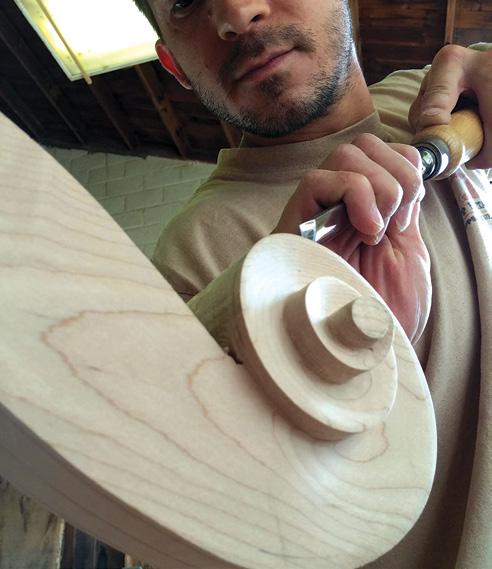
6 minute read
Conversations with Wood
lu·thi·er - noun - a maker of stringed instruments such as violins or guitars.
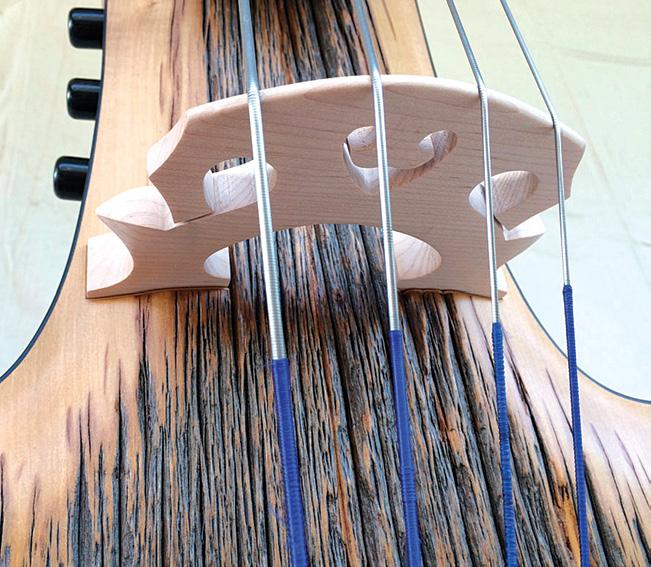
Chris Capozzoli
Conversations with Wood By Mark Freed
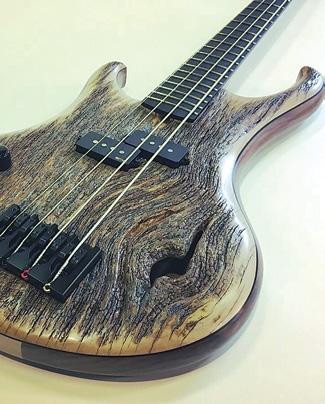
The Carolina Mountain Life region flourishes with music makers and instrument builders. Mountaineers, wellknown for their self-reliance, are industrious and determined. When a need arises, people in southern Appalachia figure out how to make it happen using the resources available to them. When people in the mountains need entertainment, they tell stories, make toys, sing songs, and learn to play instruments. And when an instrument itself is needed, often times they are handmade with the materials and tools available.
Over generations, this industrious nature has led to the mountain-style fretless banjo and Appalachian dulcimer, instruments that are identified specifically with the region. And though there are music stores and internet vendors linking today’s musicians of the Carolina Mountains to the same inventory of modern manufactured instruments as the rest of the world, the art of instrument building continues to thrive.
Chris Capozzoli and David Finck are two of our region’s luthiers, building beautiful and painstakingly detailed instruments and helping define the next generation of industrious mountain craftsmen. Their instruments are works of art and of museum-showcase quality, but they are built with players in mind—made for musicians’ hands, not to be silently hung on walls.
“I get such a thrill out of making the connection with the player, seeing that spark when they select the instrument,” David Finck tells me.
David grew up surrounded by both music and sawdust. His mother played cello, and the sounds of classical music erupted from the family stereo. His father spent free time in his wood shop, and tried his hand at making instruments. In fact, David’s father built a guitar and had plans to eventually make a violin.
The inspiration of his father’s hobby helped lead David into a career building furniture and eventually making an instrument of his own. When his two daughters began to take violin playing seriously and needed to upgrade their instruments—an expensive undertaking—David decided to try honing his skills and making them himself. He built his older daughter, Ledah, a violin in 2012, and he was thrilled with the results. Ledah loved the instrument, and David knew he had to build another for his younger daughter, Willa. After finishing Willa’s violin in the winter of 2013, David saw a clear path ahead. He loved the challenges and rewards of crafting such fine instruments, and he has hardly looked back since. Aside from an occasional commissioned guitar or other woodworking project, David has focused on building violins, violas, and cellos over the past decade, and he recently finished his 34th violin-family instrument.
“Things are starting to crystalize and mature with the instruments,” David says. “It is a real calling and brings together my love of the music, the instruments, and the musicians.” Today, David’s instruments are being used by professionals all over the country and have given him the opportunity to marry his passion for fine woodworking with the classical music that first spoke to him as a child. He has been able to carry his father’s aspirations forward, as he literally carves a name for himself in the long-standing tradition of violin making—a tradition that has gone relatively unchanged since the Italian families of the 16th century.
“It is the human spirit at its best,” David
David Finck
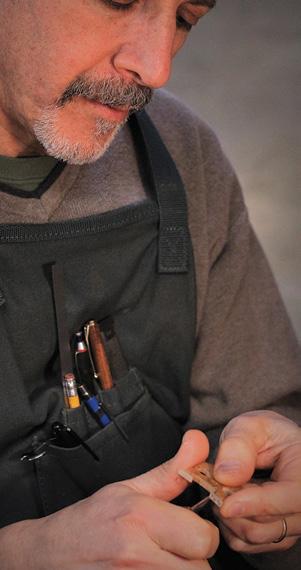
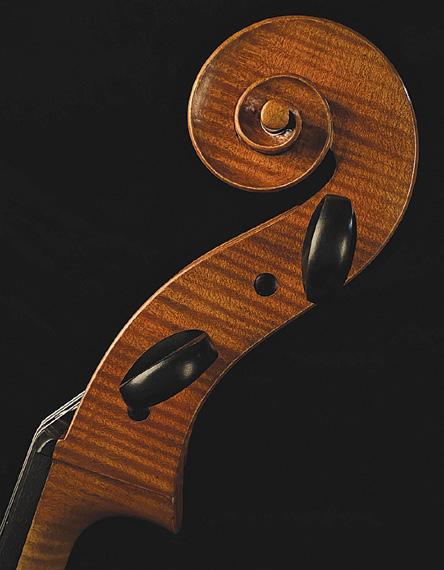
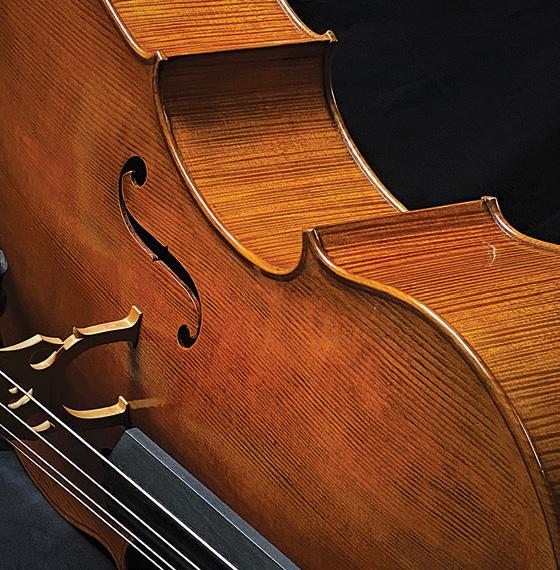
exclaims. “It is amazing to do something every day and be a part of the tradition.”
David also says that he couldn’t imagine doing this work in another location. “It all comes from the trees,” he says. “This craft is an indoor activity in small intense spaces at such a small scale—to be able to get out in the woods and nature and fresh air brings me back to the source: the trees. This is where it all begins and keeps me working.”
While David carries on a centuries-old tradition with only minute changes from the violin builders of the past, luthier Chris Capozzoli prefers to craft unique electric guitars in styles and designs all his own.
Like David, Chris started making his living as a woodworker making custom furniture, cabinetry, and filling in on construction jobs. But, also like David, Chris had a passion for music and creating. Growing up, he frequented a friend’s shop, watching him build instruments and scouring guitar magazines, paying close attention to the images.
Chris first built a guitar influenced by a Rickenbacker that caught his attention and continued working on honing his craft in his spare time. Eventually, his apartment was filling up with machines, tools, and materials; Chris decided to take a leap of faith and get his own shop. Starting with orders from friends, Chris began building both acoustic and electric guitars, and bass guitars, copying some styles he admired, while continuing to incorporate more of his own design ideas.
Encouraged by the mountains, the hills, the houses and barns, Chris started utilizing reclaimed pieces of wood from old structures and crafting unique instruments that looked like nothing that came before. “My personal inspiration derives from the environment I’m submerged in, from the materials I choose to the designs I create,” Chris says. “Much of the materials I prefer come from old barns off the local North Carolina landscapes; wood endured by the rain, snow, and sunshine on the side of these hundred-year-old structures tell stories of how difficult it’s been to hold itself up for so many years.”
Chris’s designs and imagination seem to have no boundaries. He has built elegant bass guitars with abstract curves and lines, amplifiers that looks like vintage radios, and a fiddle made with an alligator skull. Looking through Chris’s portfolio of instruments, you will find colors and shapes like no other. In addition to building and crafting the instruments, Chris is preparing to start building his own pickups, the devices that convert the vibrations of guitar strings into electrical signals. His unique approaches and designs are paying off.
Chris spent years building instruments on faith and seeking out players beyond his circle of fellow musicians in hopes they might be inspired to try them out and purchase one. Today, Chris’s calendar is filled with commissioned work, and his waitlist for interested buyers continues to grow. With more than a half dozen orders cued up, Chris’s business is turning an important corner. “It has allowed me to focus on my own designs and continue to work on the types of guitars I admire most,” he says.
Chris Capozzoli continues to push the boundaries of guitar building with modern and unique designs, and David Finck continues to fine-tune the long-standing traditions of violin building. While the dichotomy of modern forms and older traditions might set these two luthiers apart, they share a number of commonalities. Both are musicians who cherish the connections other players make with the instruments they build, both draw inspiration from the Carolina Mountains, and neither could imagine practicing their craft anywhere else.
Mark Freed is Director of Cultural Resources for the Town of Boone, NC.










